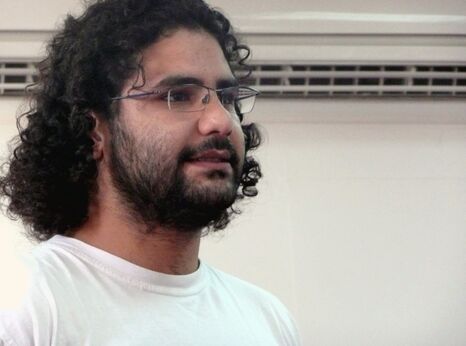Egypt: Activist and lawyer held in cruel conditions

Mohamed el-Baqer and Alaa Abdel Fattah have been detained since 29 September 2019 pending investigations into charges of “joining a terrorist group”, “funding a terrorist group”, “disseminating false news undermining national security” and “us[ing] social media to commit a publishing offense” under Case No.1356/2019 of the Supreme State Security Prosecution (SSSP).
On 29 March 2019, Alaa Abdel Fattah was released on probation after serving an unjust five-year prison term for participating in a peaceful protest. His probation terms required him to spend 12 hours every night at a police station for five years. On 29 September 2019, Alaa Abdel Fattah did not leave the Dokki police station in Cairo, where he spent his probation. The police told his mother that he was taken by National Security Agency (NSA) officers to the SSSP. Later that day, Mohamed el-Baqer entered the SSSP building to represent him. According to their families and friends, Alaa Abdel Fattah and Mohamed el-Baqer’s whereabouts were unknown until on 1 October 2019, when they appeared at Tora Maximum Security Prison 2.
On 30 August 2020, Mohamed el-Baqer was brought in front of the SSSP to face questioning into another case (No. 855/2020). The case includes other prisoners of conscience, already held in pre-trial detention in relation to separate investigations into similar unfounded terrorism-related charges, such as human rights defenders Mahienour el-Masry and Esraa Abdelfattah. According to information gathered by Amnesty International, prosecutors based the accusations against them mainly on NSA investigations case files, which defendants and their lawyers were not allowed to examine. In recent months, the SSSP has been increasingly bypassing court or prosecution decisions to release detainees held in prolonged pre-trial detention by issuing new detention orders covering similar charges.
On 23 November 2020, the Official Gazette published the decision of the Cairo Criminal Court to include Mohamed el-Baqer to the “terrorists list” for five years without any due process as part of case No. 1781/2019 by the SSSP. El-Baqer and his lawyers were not aware that he was also under investigation in case No. 1781/2019 until the publication of the decision, and he has never been questioned by the SSSP in relation to that case or provided with information about the exact charges against him. The effect of the decision includes a travel ban and prohibition from engaging in political or civic work for five years. The news about Mohamed el-Baqer’s addition to a third case and to the “terrorists list” coincided with the announcement by the Council of Bars and Law Societies in Europe to award the Human Rights Award 2020 to Mohamed el-Baqer and six other imprisoned Egyptian lawyers.
The prison authorities have mishandled the spread of COVID-19 in Egyptian prisons. Generally, prison administrations have failed to systematically distribute sanitary products, trace and screen new arrivals, or test and isolate those suspected of infection, and have concealed information about the COVID-19 outbreak from prisoners and their distraught families. Longstanding issues, such as lack of clean water, poor ventilation and overcrowding, have made physical distancing and preventative hygienic measures impossible to implement. Amnesty International also found that prison authorities hold some prisoners of conscience and others with a political profile in particularly inhumane conditions and deny them rights afforded to other prisoners with the apparent aim of punishing their dissent.
Alaa Abdel Fattah, a well-known political activist and government critic, has been repeatedly arrested in recent years including for his role in the 2011 uprising. Mohamed el-Baqer is a human rights lawyer and director of Adalah Center for Rights and Freedoms, which he founded in 2014. The organization focuses on criminal justice, the right to education and students' rights. They are among the thousands of people detained arbitrarily in Egypt solely for exercising their human rights or on the basis of grossly unfair trials, including mass and military trials. The authorities continue to severely repress the rights to freedom of expression, peaceful assembly and association. Thousands of people remain in prolonged pre-trial detention, including human rights defenders, journalists, politicians, lawyers and social media influencers.